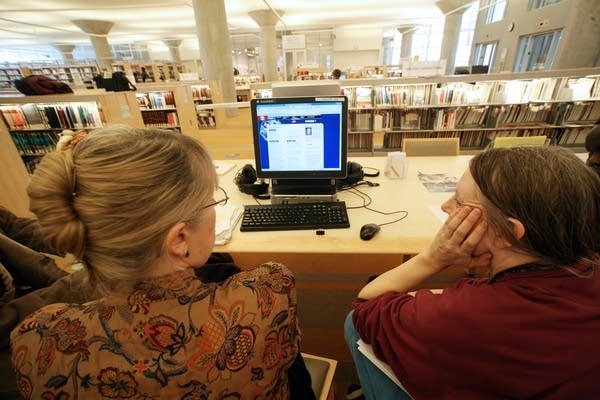Librarian's job description expands to help unemployed
Go Deeper.
Create an account or log in to save stories.
Like this?
Thanks for liking this story! We have added it to a list of your favorite stories.

The combination of a recession and changes to the typical job application process has made some local librarians into self-described social workers.
Many companies nowadays require job seekers to fill out online applications, which may be tough for people who don't know much about using the Web, or don't have access to it. Many job seekers are turning to their local librarians for help.
"It's like the new normal to have social work be part of being a librarian," said Kim Poole, a librarian at Hennepin County's Southdale Library in Edina. "Sometimes as a librarian you feel like you're throwing out a life preserver to a person ... they are often at the edge of an abyss."
Poole started working in the early 1980s during a recession and remembers memorizing the Dewey decimal number for a book on resumes and reciting it to each unemployed person who came in looking for help.
Turn Up Your Support
MPR News helps you turn down the noise and build shared understanding. Turn up your support for this public resource and keep trusted journalism accessible to all.
But when this recession began, Poole realized it would be very different.
"I could see more and more people coming in," she said. "You often saw a lot of older people which was quite frightening for them because a lot of those people had been working at jobs for 25 to 30 years and some of those jobs never involved any computer access, so suddenly they are thrown out to find a job without any kind of computer skills."
More people kept coming through the doors of Southdale and Hennepin County's 40 other libraries. 5.6 million in-person visits to the libraries last year were counted.

Many of the county's libraries have added classes on computer skills. Librarians simultaneously answer questions over email, instant message, and as people walk up to their desks.
But some people who are out of work come just because the library gives their day structure. They like the library's atmosphere of universal respect, despite where a person might be in life.
Susan Tucker spends as much as five hours at Southdale every weekday, even though she has an internet connection at home.
"If I stay at home, I'm too distracted by everything," Tucker said.
Tucker's been out of work for a year and is looking for a job in medical sales. The librarians show her Web sites that help her prepare for job interviews.
"You know you're not going to do well on an interview if you just fly by the seat of your pants," Tucker said. "So I go to a lot of sites that have like ten tough interview questions and how to answer them."
A study published late last month found that a third of Americans 14 and older use computers at public libraries.
Chrystie Hill, the Community Services Director for WebJunction, a large online community of librarians across the country, said some people may know the basics of the internet, but need help finding the right information.
"They're connecting their patrons not only with the workforce and related resources, but all the social services that come along many times for people who are in an unemployment situation," Hill said.
But even as they help people get back on their feet, libraries are dealing with their own money problems. Jennifer Nelson does strategic planning for Hennepin County's library system and said she is trying to adapt the budget to maintain important services.
"The major challenge is how ... do we make those difficult decisions about what changes," she said. "I think we're just really aware that some changes must be made."
Librarians assume the number of people they serve will continue to grow, but at the same time, they'll likely have to deal with a flat budget or budget cuts.
At Southdale, Kim Poole said she was initially overwhelmed by the increasing number of patrons and the increasing demands on her time, but she's gotten used to it.
"We can hold that hand out and try to pull them in with the rest of the population that has those computer skills," she said.
Poole said people usually come regularly for a few months, and she gets to know them -- until the day they don't show up because they got a job.
That makes Poole wonder if her job description will still include social work when the economy improves.
Dear reader,
Political debates with family or friends can get heated. But what if there was a way to handle them better?
You can learn how to have civil political conversations with our new e-book!
Download our free e-book, Talking Sense: Have Hard Political Conversations, Better, and learn how to talk without the tension.





